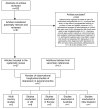Observational studies of depression in primary care: what do we know?
- PMID: 17493280
- PMCID: PMC1890289
- DOI: 10.1186/1471-2296-8-28
Observational studies of depression in primary care: what do we know?
Abstract
Background: We undertook a systematic review of observational studies of depression in primary care to determine 1) the nature and scope of the published studies 2) the methodological quality of the studies; 3) the identified recovery and risk factors for persistent depression and 3) the treatment and health service use patterns among patients.
Methods: Searches were conducted in MEDLINE, CINAHL and PsycINFO using combinations of topic and keywords, and Medical Subject Headings in MEDLINE, Headings in CINAHL and descriptors in PsycINFO. Searches were limited to adult populations and articles published in English during 1985-2006.
Results: 40 articles from 17 observational cohort studies were identified, most were undertaken in the US or Europe. Studies varied widely in aims and methods making it difficult to meaningfully compare the results. Methodological limitations were common including: selection bias of patients and physicians; small sample sizes (range 35-108 patients at baseline and 20-59 patients at follow-up); and short follow-up times limiting the extent to which these studies can be used to inform our understanding of recovery and relapse among primary care patients with depression. Risk factors for the persistence of depression identified in this review were: severity and chronicity of the depressive episode, the presence of suicidal thoughts, antidepressant use, poorer self-reported quality of life, lower self-reported social support, experiencing key life events, lower education level and unemployment.
Conclusion: Despite the growing interest in depression being managed as a chronic illness, this review identified only 17 observational studies of depression in primary care, most of which have included small sample sizes and been relatively short-term. Future research should be large enough to investigate risk factors for chronicity and relapse, and should be conducted over a longer time frame.
Figures
References
-
- Murray C, Lopez A. The Global Burden of Disease. Boston, Mass, World Health Organisation and Harvard University Press; 1996.
-
- Culpepper L. The active management of depression. Journal of Family Practice. 2002;51:769–776. - PubMed
-
- van Weel-Baumgarten EM, Schers HJ, van den Bosch WJ, van den Hoogen H, Zitman FG. Long-term follow-up of depression among patients in the community and in family practice settings: A systematic review. The Journal of Family Practice. 2000;49:1113–1120. - PubMed
Publication types
MeSH terms
Substances
LinkOut - more resources
Full Text Sources
Medical



